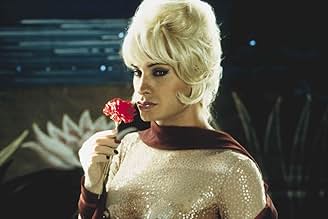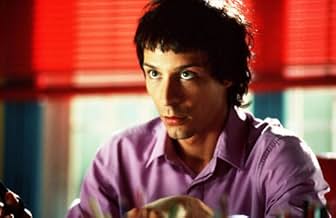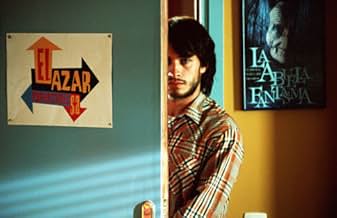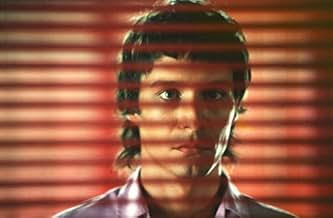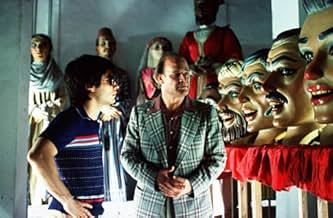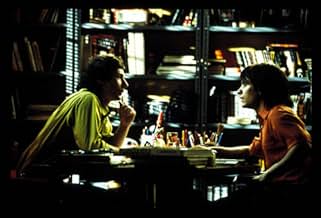An examination on the effect of Franco-era religious schooling and sexual abuse on the lives of two longtime friends.An examination on the effect of Franco-era religious schooling and sexual abuse on the lives of two longtime friends.An examination on the effect of Franco-era religious schooling and sexual abuse on the lives of two longtime friends.
- Nominated for 1 BAFTA Award
- 16 wins & 42 nominations total
Nacho Pérez
- Ignacio
- (as Ignacio Pérez)
Raúl García Forneiro
- Enrique
- (as Raúl Gª Forneiro)
Agustín Almodóvar
- Limpiador Piscina
- (uncredited)
Pedro Almodóvar
- Limpiador Piscina
- (uncredited)
Robert Forcadell
- Man in public
- (uncredited)
Luis Lobos Negros
- Motero ochentero
- (uncredited)
- Director
- Writer
- All cast & crew
- Production, box office & more at IMDbPro
Storyline
Did you know
- TriviaGael García Bernal fired off an angry riposte to New York Times reporter Lynn Hirschberg after she claimed that he had fallen out with Pedro Almodóvar over filming the explicit homosexual love scenes in the film. Bernal wanted it on record that he had had absolutely no reservations about taking the role.
- GoofsWhen Burenguer declines Ignacio's story over the phone, he says that he wouldn't be accepting it for "Short Stories of the 80's." According to his story, it would have had to been at least 1977, three years before the 1980s, let alone before a compilation of stories from the 1980s would be released.
- Alternate versionsAn R-rated version of the film that trims or cuts some scenes was released on DVD, though the original NC-17 one is also available in the exact same format.
- SoundtracksQuizás, Quizás, Quizás
Written by Osvaldo Farrés
Published by Peer International Corporation (BMI)
(c) 1947 by Caribbean Music Co. Ltd
Performed by Sara Montiel
By the license from Dpto. de Productos Especiales de (p) EMI Odeon, S.A., Madrid, España, 2003
Featured review
Spoilers
Since 'Hable con ella' ('Talk to her', for which my summary line was 'Almodovar mellowing?') which some consider Almodovar's best, his fans have been looking forward to his next one with great expectation but also some apprehension as to how could he possibly tope it, in the sheer ingenious creativity, if nothing else. Bound for Cannes release, Bad Education soon demonstrated that the apprehension is not unfounded. It is, after all, not easy to surpass the achievement of Hanle con ella. Undoubtedly still Almodovar, Bad Education however is Almodovar melodrama, a little short of Almodovar masterpiece.
The film opens with attention grabbing, definitive music (regardless of what mood) that is Almodovar's hallmark. Similarly, we see the inimitable Almodovar feuding colours. Homosexuality and fetishism you'll almost always expect in an Almodovar film but there is less extreme perversity and violence compared with some of his other pictures.
And here comes the plot. The story of the young altar boys is told in a manuscript of a book entitled 'The Visit', which is used by one of the grown-up boys Ignacio, now a transvestite called Zahara, as a tool for blackmailing Father Manolo. But wait, all this is just in a screenplay. The story of Father Manolo and the altar boys however is real. The real Ignacio is the screenplay writer, who is trying to get Enrique the film director, another grown-up altar boy, to produce the film. But wait again, Ignacio doesn't want to be called Ignacio, claiming that he is now a fully transformed person called Angel, an actor trying very hard to get to play the part Zahara. Having fun yet? There's more. Enrique becomes suspicious if Ignacio/Angel is really the Ignacio he knew as a kid, and embarks on an investigation. Meanwhile, Father Monolo jumps out of the screenplay, materialising as a real person. And all these stories within stories are told jumping back and forth between past and present, fiction and reality. Enough? There's more, a lot more.
In the end, Bad Education, while enormously entertaining, stops at being just that instead of moving further into the realm of depth of emotion and breadth of creativity we see in Talk to Her and All About Mother. However, in addition to the entertainment, there is one particularly bright spot, one Gael Garcia Bernal (playing Angel and all the rest of them) who first served notice in the brilliant Mexican film Amores perros (2000) that he has to be reckoned with. I just can't wait to see him play Cuban revolutionary icon 'Che' Geuvara in Motorcycle Diaries (2004).
Since 'Hable con ella' ('Talk to her', for which my summary line was 'Almodovar mellowing?') which some consider Almodovar's best, his fans have been looking forward to his next one with great expectation but also some apprehension as to how could he possibly tope it, in the sheer ingenious creativity, if nothing else. Bound for Cannes release, Bad Education soon demonstrated that the apprehension is not unfounded. It is, after all, not easy to surpass the achievement of Hanle con ella. Undoubtedly still Almodovar, Bad Education however is Almodovar melodrama, a little short of Almodovar masterpiece.
The film opens with attention grabbing, definitive music (regardless of what mood) that is Almodovar's hallmark. Similarly, we see the inimitable Almodovar feuding colours. Homosexuality and fetishism you'll almost always expect in an Almodovar film but there is less extreme perversity and violence compared with some of his other pictures.
And here comes the plot. The story of the young altar boys is told in a manuscript of a book entitled 'The Visit', which is used by one of the grown-up boys Ignacio, now a transvestite called Zahara, as a tool for blackmailing Father Manolo. But wait, all this is just in a screenplay. The story of Father Manolo and the altar boys however is real. The real Ignacio is the screenplay writer, who is trying to get Enrique the film director, another grown-up altar boy, to produce the film. But wait again, Ignacio doesn't want to be called Ignacio, claiming that he is now a fully transformed person called Angel, an actor trying very hard to get to play the part Zahara. Having fun yet? There's more. Enrique becomes suspicious if Ignacio/Angel is really the Ignacio he knew as a kid, and embarks on an investigation. Meanwhile, Father Monolo jumps out of the screenplay, materialising as a real person. And all these stories within stories are told jumping back and forth between past and present, fiction and reality. Enough? There's more, a lot more.
In the end, Bad Education, while enormously entertaining, stops at being just that instead of moving further into the realm of depth of emotion and breadth of creativity we see in Talk to Her and All About Mother. However, in addition to the entertainment, there is one particularly bright spot, one Gael Garcia Bernal (playing Angel and all the rest of them) who first served notice in the brilliant Mexican film Amores perros (2000) that he has to be reckoned with. I just can't wait to see him play Cuban revolutionary icon 'Che' Geuvara in Motorcycle Diaries (2004).
- harry_tk_yung
- Sep 20, 2004
- Permalink
- How long is Bad Education?Powered by Alexa
Details
- Release date
- Countries of origin
- Official site
- Languages
- Also known as
- Kịch Bản Sát Nhân
- Filming locations
- Production companies
- See more company credits at IMDbPro
Box office
- Budget
- $5,000,000 (estimated)
- Gross US & Canada
- $5,284,284
- Opening weekend US & Canada
- $147,370
- Nov 21, 2004
- Gross worldwide
- $40,432,275
- Runtime1 hour 46 minutes
- Sound mix
- Aspect ratio
- 2.35 : 1
Contribute to this page
Suggest an edit or add missing content


